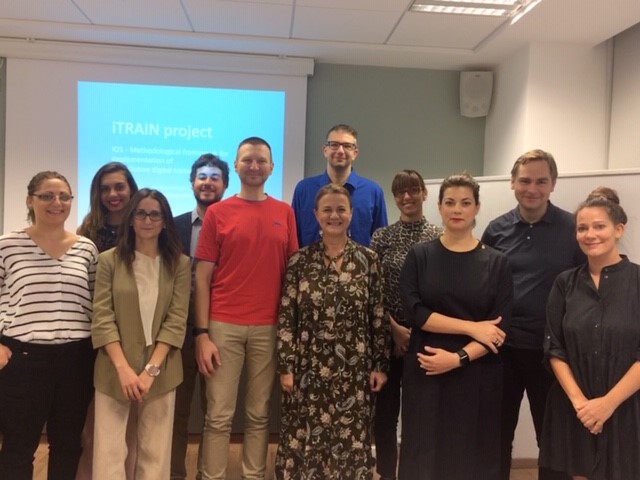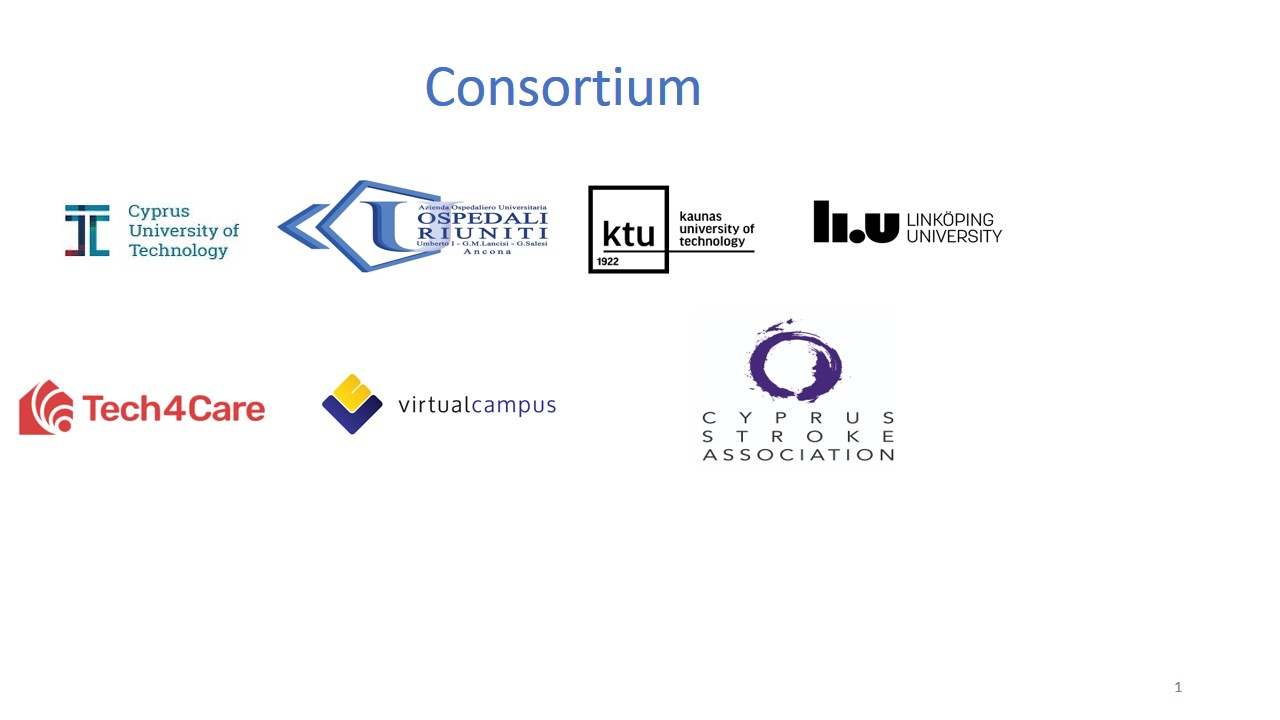
The Department of Rehabilitation Sciences of the Cyprus University of Technology hosted the Kick-Off Meeting of the Erasmus + Project “Mobile Digital Training for Direct Care Workers dealing with Stroke Survivors (iTRAIN)” (2019-1-CY01-KA202-058338) on the 13th and 14th November 2019 at the University Rehabilitation Clinic in Limassol.
PROJECT SUMMARY
Stroke is the second leading cause of disability and is clearly associated with old age, with the risk of suffering a stroke doubling in each successive decade from 55 years on. The dramatic increase in the demand for stroke rehabilitation, due to current epidemiological trends, is putting care providers and direct care workers under enormous pressure.
Direct care workers are a key category in all care settings due to their essential role of providing personal care to patients with stroke (e.g., bathing, hygiene, feeding), practical help (e.g., mobility, socialisation, health education) and support to other health professionals in a variety of activities (e.g., basic medications, preparation of medical tools, administration of drug therapy).
The ordinary work context direct care workers have to deal with when assisting people with stroke is highly demanding. They are the most burdened group of workers (since they carry out the most essential tasks) and the least trained one (no academic title for their position is required). Vocational training is also lacking, since the context in which they work usually does not stimulate them to engage in lifelong training activities. Evidence from the literature suggests that if adequately trained, direct-care staff can contribute to greatly improve patient outcomes, e.g. in terms of quality of life, reduction of agitation, promotion of independence etc., at the same time improving their own working conditions. Better-trained staff is indeed more likely to benefit from a reduced work-related stress, burden and injuries.
GOAL AND OBJECTIVES: The main goal of the iTRAIN project is to make evidence-based knowledge available also for low-skilled direct care workers involved in stroke care and rehabilitation in home care, hospital and nursing home settings. The project aims to translate up-to-date evidence in accessible, engaging and innovative vocational training on stroke for direct care workers, reaching this category of different professionals who are normally excluded from this knowledge. The iTRAIN project objective is to address this training gap by providing a set of mobile-based digital training contents, designed and developed together with patients, their family caregivers, direct care workers and clinical experts in the field.
INNOVATIVE TRAINING PACKAGE: A comprehensive vocational training package, publicly available and usable by mobile devices, will be at disposal of direct care workers dealing with stroke survivors. The package will be produced in six European languages (English, Greek, Swedish, Italian, Portuguese, Lithuanian). The package will include five INTELLECTUAL OUTPUTS (IOs): methodological framework for implementation of a digital inclusive training of direct care workers dealing with stroke survivors (IO1); vocational education methodology and handbook (IO2); multimedial training videos of patients, caregivers and experts (IO3); mobile-based serious game for learning and self-assessment (IO4); massive online open course (MOOC) with all multimedial materials.
NUMBER OF TARGETED BENEFICIARIES
The project will involve, in an interactive co-design, testing and dissemination process, over 2,800 participants, including direct care workers (primary target group), patients, family caregivers, employers, unions, patients' associations, clinical units for stroke, and other stakeholders (secondary and tertiary target groups).
RESULTS AND IMPACT
The iTRAIN project will create a comprehensive vocational training package, publicly available and usable also by mobile devices, at disposal of direct care workers dealing with stroke survivors for free in six European languages (English, Greek, Swedish, Italian, Portuguese, Lithuanian). The training package characteristics are expected to provide a motivating and enjoyable learning experience for a group of workers usually excluded by lifelong learning activities. The use of an ICT-based gamification approach for delivering the training package will allow establishing both feedback loops to adapt VET provision to end-users needs and an objective tracking systems of learning outcomes. The training package is expected to improve direct care workers attitudes towards people with stroke and their family caregivers (most of all, their level of empathy and understanding towards these users); improve their knowledge, skills and competences on stroke care and rehabilitation; provide them with practical inputs from best practices in stroke care for stimulating reflections on how to improve their clinical routines.

The Project Coordinator is Associate Professor Maria Kambanaros from the Cyprus University of Technology, the host (HO) organization.
The Project Partners are Linkӧping University (LIU: Sweden) represented by Prof. Andreas Motel- Klingenbiel, Ancona University Hospital (Italy) represented by Prof. Maria Gabriella Ceravolo, Kaunas University of Technology (KU: Lithuania) represented by Prof. Rytis Maskeliunas, Virtual Campus (VC: Portugal) represented by Prof. Carlos Vaz de Carvalho, the Cyprus Stroke Association represented by Ms. Marina Charalambous and Tech4Care (Italy) represented by Dr. Francesco Barbabella.
The kick-off meeting was chaired by Prof. Maria Kambanaros (CUT), and attended by the following: Dr. Eliada Pampoulou (CUT), Viktoria Eden (CUT), Andrie Ioannou (CUT), Marina Charalambous (Cyprus Stroke Association), Arianna Poli (LIU), Dr. Francesco Barbabella (Tech4Care), Vincenzo Aschettino (Tech4Care) ,Hannah Schiff Braz (VC), Prof. Rytis Maskeliunas (KTU) and Prof. Robertas Damaševicius (KTU).
Εκδήλωση εορτασμού των 10 χρόνων λειτουργίας της Βιβλιοθήκης «Βασίλης Μιχαηλίδης»

The Department of Rehabilitation Sciences of the Cyprus University of Technology hosted the Kick-Off Meeting of the Erasmus + Project “Mobile Digital Training for Direct Care Workers dealing with Stroke Survivors (iTRAIN)” (2019-1-CY01-KA202-058338) on the 13th and 14th November 2019 at the University Rehabilitation Clinic in Limassol.
PROJECT SUMMARY
Stroke is the second leading cause of disability and is clearly associated with old age, with the risk of suffering a stroke doubling in each successive decade from 55 years on. The dramatic increase in the demand for stroke rehabilitation, due to current epidemiological trends, is putting care providers and direct care workers under enormous pressure.
Direct care workers are a key category in all care settings due to their essential role of providing personal care to patients with stroke (e.g., bathing, hygiene, feeding), practical help (e.g., mobility, socialisation, health education) and support to other health professionals in a variety of activities (e.g., basic medications, preparation of medical tools, administration of drug therapy).
The ordinary work context direct care workers have to deal with when assisting people with stroke is highly demanding. They are the most burdened group of workers (since they carry out the most essential tasks) and the least trained one (no academic title for their position is required). Vocational training is also lacking, since the context in which they work usually does not stimulate them to engage in lifelong training activities. Evidence from the literature suggests that if adequately trained, direct-care staff can contribute to greatly improve patient outcomes, e.g. in terms of quality of life, reduction of agitation, promotion of independence etc., at the same time improving their own working conditions. Better-trained staff is indeed more likely to benefit from a reduced work-related stress, burden and injuries.
GOAL AND OBJECTIVES: The main goal of the iTRAIN project is to make evidence-based knowledge available also for low-skilled direct care workers involved in stroke care and rehabilitation in home care, hospital and nursing home settings. The project aims to translate up-to-date evidence in accessible, engaging and innovative vocational training on stroke for direct care workers, reaching this category of different professionals who are normally excluded from this knowledge. The iTRAIN project objective is to address this training gap by providing a set of mobile-based digital training contents, designed and developed together with patients, their family caregivers, direct care workers and clinical experts in the field.
INNOVATIVE TRAINING PACKAGE: A comprehensive vocational training package, publicly available and usable by mobile devices, will be at disposal of direct care workers dealing with stroke survivors. The package will be produced in six European languages (English, Greek, Swedish, Italian, Portuguese, Lithuanian). The package will include five INTELLECTUAL OUTPUTS (IOs): methodological framework for implementation of a digital inclusive training of direct care workers dealing with stroke survivors (IO1); vocational education methodology and handbook (IO2); multimedial training videos of patients, caregivers and experts (IO3); mobile-based serious game for learning and self-assessment (IO4); massive online open course (MOOC) with all multimedial materials.
NUMBER OF TARGETED BENEFICIARIES
The project will involve, in an interactive co-design, testing and dissemination process, over 2,800 participants, including direct care workers (primary target group), patients, family caregivers, employers, unions, patients' associations, clinical units for stroke, and other stakeholders (secondary and tertiary target groups).
RESULTS AND IMPACT
The iTRAIN project will create a comprehensive vocational training package, publicly available and usable also by mobile devices, at disposal of direct care workers dealing with stroke survivors for free in six European languages (English, Greek, Swedish, Italian, Portuguese, Lithuanian). The training package characteristics are expected to provide a motivating and enjoyable learning experience for a group of workers usually excluded by lifelong learning activities. The use of an ICT-based gamification approach for delivering the training package will allow establishing both feedback loops to adapt VET provision to end-users needs and an objective tracking systems of learning outcomes. The training package is expected to improve direct care workers attitudes towards people with stroke and their family caregivers (most of all, their level of empathy and understanding towards these users); improve their knowledge, skills and competences on stroke care and rehabilitation; provide them with practical inputs from best practices in stroke care for stimulating reflections on how to improve their clinical routines.

The Project Coordinator is Associate Professor Maria Kambanaros from the Cyprus University of Technology, the host (HO) organization.
The Project Partners are Linkӧping University (LIU: Sweden) represented by Prof. Andreas Motel- Klingenbiel, Ancona University Hospital (Italy) represented by Prof. Maria Gabriella Ceravolo, Kaunas University of Technology (KU: Lithuania) represented by Prof. Rytis Maskeliunas, Virtual Campus (VC: Portugal) represented by Prof. Carlos Vaz de Carvalho, the Cyprus Stroke Association represented by Ms. Marina Charalambous and Tech4Care (Italy) represented by Dr. Francesco Barbabella.
The kick-off meeting was chaired by Prof. Maria Kambanaros (CUT), and attended by the following: Dr. Eliada Pampoulou (CUT), Viktoria Eden (CUT), Andrie Ioannou (CUT), Marina Charalambous (Cyprus Stroke Association), Arianna Poli (LIU), Dr. Francesco Barbabella (Tech4Care), Vincenzo Aschettino (Tech4Care) ,Hannah Schiff Braz (VC), Prof. Rytis Maskeliunas (KTU) and Prof. Robertas Damaševicius (KTU).



